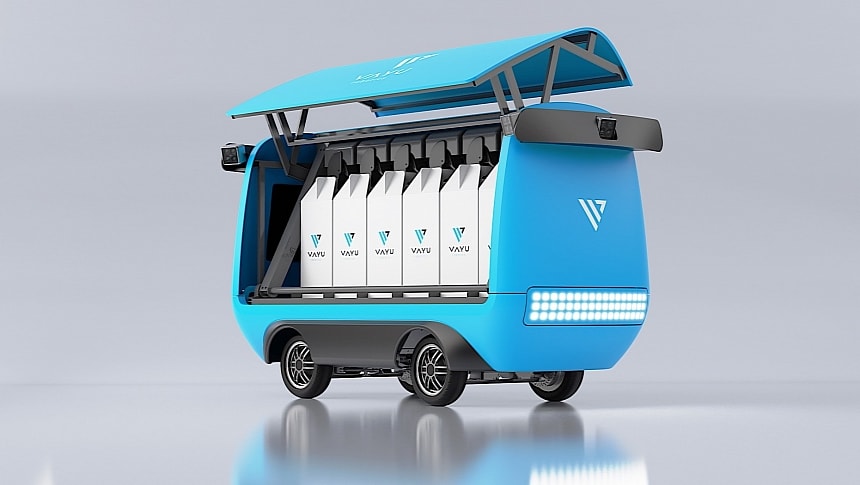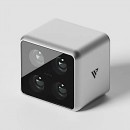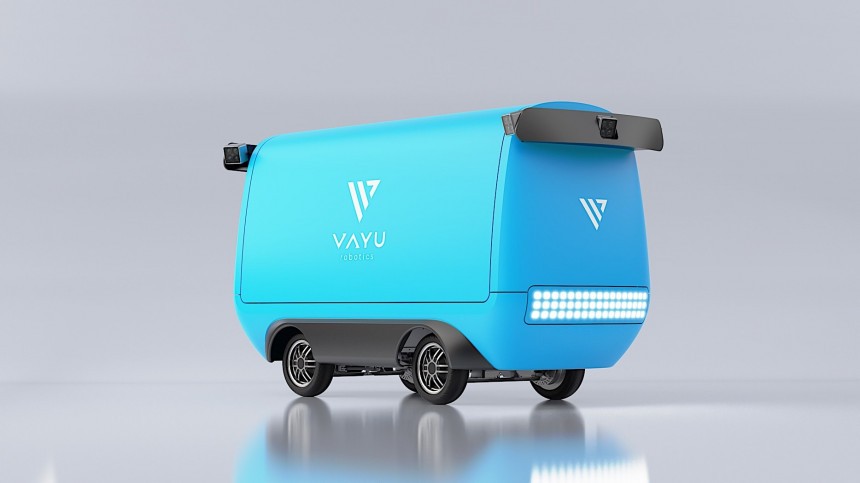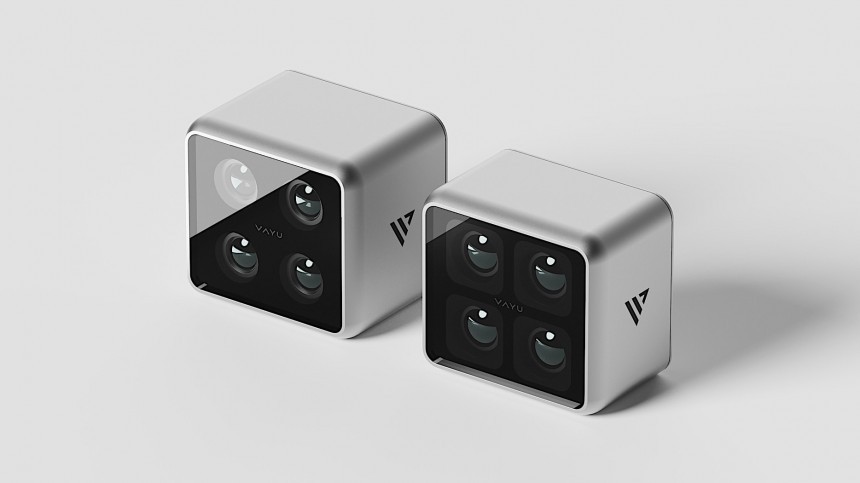All the breakthroughs made in recent years in the field of transportation, in any medium, are slowly beginning to take hold, and they will soon change our society. Electric cars are all over the place, vertical take-off and landing aircraft are slowly making their way from dreamland into the real world, and the delivery of goods will soon be taken over by drones and autonomous land vehicles.
There is already an increasing number of retail companies, including Amazon, who turn to drones to ship orders. But drones still have limitations, including in terms of the size and weight of the packages they can carry. That's why land-based means of delivery will probably be in high demand for many more years to come.
But it doesn't mean these land-based vehicles will have to be operated by a human sitting physically inside said vehicle. Enough breakthroughs have been recorded in the field of autonomy to allow for the rise of autonomous delivery robots. And their breed might just as well be born this week with something made by a company called Vayu Robotics.
Don't worry if the name doesn't ring any bells. The company has been around for just three years, born from the minds of several people who used to work in autonomous and artificial intelligence projects over at Lyft, Apple, Google, and Facebook.
These guys got together with the stated goal to "slash the cost of e-commerce deliveries," and the way they are planning to do that is with a contraption called the Vayu One – an apparently small (but scalable) delivery robot that can drive itself to pretty much everywhere it is sent.
Looking a bit like a mail cart the corporations of old used to have, but significantly more potent than that, the robot moves on four wheels thanks to a drive system that was not detailed. It doesn't have room for people inside, but it can carry, in the present configuration, up to 100 pounds (45 kg) of cargo. The fastest the robot can travel is 20 mph (32 kph).
I know, the details above are not exactly spectacular, so why would we care about a tiny robot that can deliver small packages to driveways or porches? Well, read on, and you'll soon understand.
Generally speaking, autonomous vehicles are expensive to make and operate, not in small part because of the many sensors, including lidar, and software that go into them. The Vayu One, however, is as simple as it gets, and it doesn't even use lidar.
Instead, it packs only a series of passive sensors, but that should make it more than capable of completing its tasks, even if it has to travel in previously unexplored areas with no per-mapping available. How can that be?
Aside from its cargo-carrying components, the Vayu One comprises two main elements. The first is something called the Vayu Sense, the tech that replaces the lidar. It is a small device that features a plenoptic sensor run by an artificial intelligence program.
According to the company that makes it, the Sense "excels at high-resolution depth and precision, small object detection, negative space and robust perception under challenging conditions." That means this vision-based approach works in low light, glare, fog, and even when reflections are present.
The robot's second main element is the Vayu Drive, a machine learning-based system that technically forms the brain of the vehicle. We're told the thing only requires 100 hours of real-world data collection to be suitable for deployment in a multitude of roles.
That sounds great and all, but if it hadn't been for an announcement made today by the company, we would have probably overlooked this robot altogether. In a nutshell, you're looking at the "first real-world application of an autonomous delivery robot" in America.
Vauy said that a small army of these robots will be fielded in the hands of a massive e-commerce customer sometime soon. The company doesn't spell out the name of the retailer (take a guess, it's not hard), but it does reveal that it ordered no less than 2,500 of them.
The robots are to be used for "ultra-fast goods delivery" by sending the robots out into the streets and right up to your front door. Or, you could just as well witness them going about their business inside stores themselves.
We will anxiously wait for confirmation on who the e-commerce giant that purchased so many Vayus is. But know these 2,500 robots are only the beginning, as Vayu is in talks with other customers as well.
On top of it, the tech that forms the basis of the Vayu Sense and Vayu Drive systems are already advertised to a "leading global robotics manufacturer" (also unnamed) and other interested parties as a potential replacement for the expensive and pretentious lidar sensors.
But it doesn't mean these land-based vehicles will have to be operated by a human sitting physically inside said vehicle. Enough breakthroughs have been recorded in the field of autonomy to allow for the rise of autonomous delivery robots. And their breed might just as well be born this week with something made by a company called Vayu Robotics.
Don't worry if the name doesn't ring any bells. The company has been around for just three years, born from the minds of several people who used to work in autonomous and artificial intelligence projects over at Lyft, Apple, Google, and Facebook.
These guys got together with the stated goal to "slash the cost of e-commerce deliveries," and the way they are planning to do that is with a contraption called the Vayu One – an apparently small (but scalable) delivery robot that can drive itself to pretty much everywhere it is sent.
Looking a bit like a mail cart the corporations of old used to have, but significantly more potent than that, the robot moves on four wheels thanks to a drive system that was not detailed. It doesn't have room for people inside, but it can carry, in the present configuration, up to 100 pounds (45 kg) of cargo. The fastest the robot can travel is 20 mph (32 kph).
Generally speaking, autonomous vehicles are expensive to make and operate, not in small part because of the many sensors, including lidar, and software that go into them. The Vayu One, however, is as simple as it gets, and it doesn't even use lidar.
Instead, it packs only a series of passive sensors, but that should make it more than capable of completing its tasks, even if it has to travel in previously unexplored areas with no per-mapping available. How can that be?
Aside from its cargo-carrying components, the Vayu One comprises two main elements. The first is something called the Vayu Sense, the tech that replaces the lidar. It is a small device that features a plenoptic sensor run by an artificial intelligence program.
According to the company that makes it, the Sense "excels at high-resolution depth and precision, small object detection, negative space and robust perception under challenging conditions." That means this vision-based approach works in low light, glare, fog, and even when reflections are present.
The robot's second main element is the Vayu Drive, a machine learning-based system that technically forms the brain of the vehicle. We're told the thing only requires 100 hours of real-world data collection to be suitable for deployment in a multitude of roles.
Vauy said that a small army of these robots will be fielded in the hands of a massive e-commerce customer sometime soon. The company doesn't spell out the name of the retailer (take a guess, it's not hard), but it does reveal that it ordered no less than 2,500 of them.
The robots are to be used for "ultra-fast goods delivery" by sending the robots out into the streets and right up to your front door. Or, you could just as well witness them going about their business inside stores themselves.
We will anxiously wait for confirmation on who the e-commerce giant that purchased so many Vayus is. But know these 2,500 robots are only the beginning, as Vayu is in talks with other customers as well.
On top of it, the tech that forms the basis of the Vayu Sense and Vayu Drive systems are already advertised to a "leading global robotics manufacturer" (also unnamed) and other interested parties as a potential replacement for the expensive and pretentious lidar sensors.









